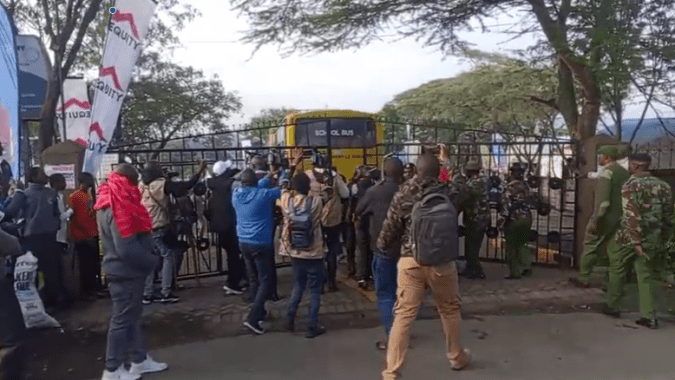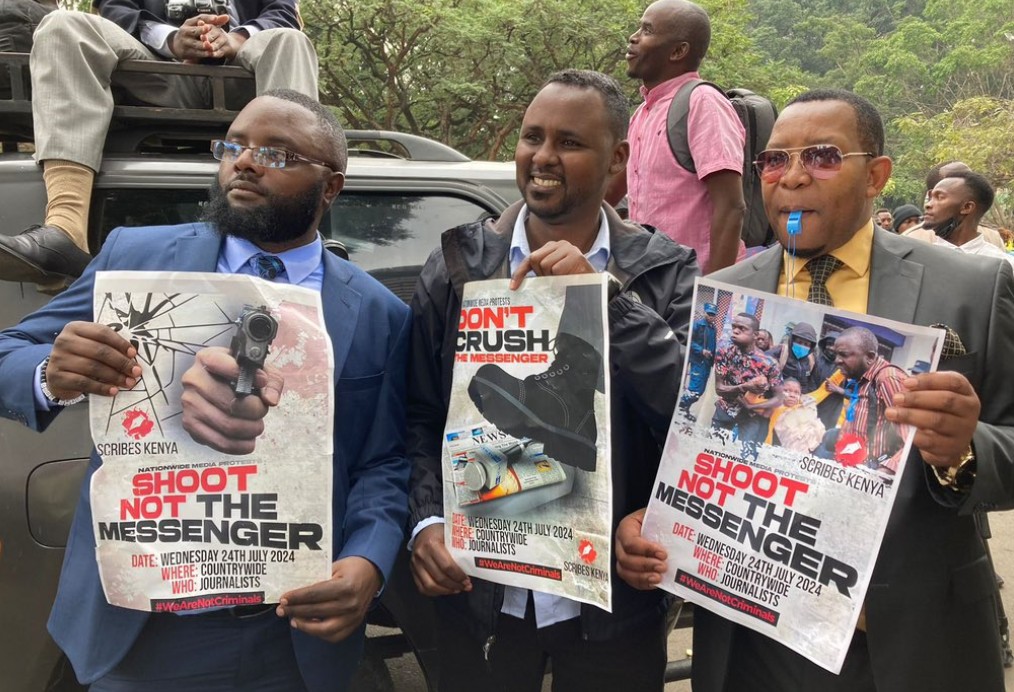Kenya is dealing with a concerning trend as the world observes World Press Freedom Day: the increasing harassment of journalists by the police.
A number of recent events, ranging from physical assaults to arrests, have sparked concerns about the nation’s dwindling press freedom. These acts jeopardise the public’s right to knowledge in addition to endangering the safety of journalists.
As the world marks World Press Freedom Day, Kenyans woke up to disturbing news: the arrest of four filmmakers linked to the viral ‘Blood Parliament’ documentary that exposed the police and linked a military officer to the shootings that happened at parliament on June 25, 2024, during the anti-Finance Bill 2024 protests.
Here are five disturbing cases that paint a stark picture of the challenges facing Kenya’s media today, starting with the most recent one.
Filmmakers’ arrest
On Saturday, May 3, 2025, Kenyans woke to the shocking news of four filmmakers linked to the viral ‘Blood Parliament’ documentary by the British Broadcasting Corporation (BBC) being arrested.
The four, Nicholas Gichuki, Brian Adagala, MarkDenver Karubiu, and Chris Wamae, were arrested on the eve of World Press Freedom Day.
They were separated into two groups upon their arrest, with Gichuki and Adagala being held at Pangani police station, as revealed by lawyer Ian Mutiso.
Karubiu and Wamae were detained at Muthaiga station.
Activist Boniface Mwangi took to social media to claim that two of the arrestedfilmmakers, Markdenver Karubiu and Brian Adagala,were his colleagues at Sema Ukweli,an independent media platform that exposes injustices and human rights violations faced by ordinary Kenyans.
Mwangi further defended the four, claiming that they were not at any point involved in the production of the ‘Blood Parliament’ documentary.
“Two of the four filmmakers the police arrested yesterday are my colleagues at @SemaUkweliKenya. Markdenver Karubiu and Brian Adagala are honest, hard-working videographers who are on the frontline of exposing human rights violations, bad governance, and corruption. Nicholas Wambugu is an award-winning filmmaker and a solid storyteller. Christopher Wamae is a filmmaker who was just hanging out with his friends. It’s suspected their arrest is linked to the #BloodParliament documentary recently aired by the BBC,” Mwangi stated.

He further noted that the police would not find anything incriminating in the equipment and hard disks confiscated from the four filmmakers, some of which he said belong to the Sema Ukweli media house.
“None of them were involved in its production; however, investigative stories involve small teams, and everyone is engaged on a needs basis. Those of us who featured in the documentary were interviewed by a BBC cameraman.
“Arresting innocent people and confiscating their hard disks and equipment is criminal behaviour by Ruto’s regime. They will find nothing incriminating. Today is World Press Freedom Day, but there is no freedom of press, expression, association, or even protest in Kenya.
“Kenyans are assaulted, abducted, and even murdered every single day. Not a day passes without an abduction, assault, or even killing of an innocent person by the state. Cry for our beloved country.”
All four were on Saturday, May 3, 2025, freed without being charged, as seen in a video shared by veteran journalist John Allan Namu.
Photojournalist attacked
On Sunday, April 27, 2025, Daily Nation photojournalist Chris Omalla was assaulted by a police officer during the Gor Mahia vs Mara Sugar match at Dandora Stadium in Nairobi.
The incident caused an uproar, prompting the Football Kenya Federation (FKF) to open a probe.
FKF, in a press statement issued on Tuesday, April 29, 2025, condemned the incident and maintained that such actions are unacceptable and have no place in Kenyan football.
The Hussein Mohammed-led federation further vowed to ensure the safety of journalists and football fans in stadiums during the matches.
Nakuru drama festival
In April 2025, the National Police Service (NPS) issued a disciplinary warning to its officers, following the circulation of reports that officers were involved in the harassment of journalists during coverage of the Kenya National Drama and Film Festival in Nakuru, terming any such conduct as unprofessional and unacceptable.

In a statement released on Thursday, April 10, 2025, NPS said it had taken note of widespread reports circulating on both social and mainstream media platforms, which accused police officers of interfering with journalists who were lawfully executing their duties during the festival.
The said harassment erupted on Wednesday, April 9, 2025, and continued into Thursday, April 10, 2025, following attempts by members of the press to cover a controversial play by Butere Girls’ High School—previously banned due to its piercing critique of the government.

For much of Wednesday evening, journalists endured a distressing ordeal as officers persistently lobbed tear gas canisters at them, barring access to the halls of the Melvin Jone Lions School in Nakuru, where the students were scheduled to rehearse the production.
Majengo clashes
In March 2025, NPS launched investigations into claims of a section of its officers obstructing journalists who were covering the violent Majengo protests on Wednesday, March 5, 2025.
Police spokesperson Muchiri Nyaga, in a statement issued via the NPS official social media accounts, condemned the incident, noting that the circumstances surrounding it were already under investigation.
The police statement came after a photo showing a police officer blocking a photographer from accessing his camera went viral on social media.
There were also claims of another officer deleting footage recorded by journalists during the Wednesday protests in the Majengo area of Nairobi.
2024 anti-govt protests
Journalists endured police harassment while covering the widespread anti-government protests in 2024.
Journalists were forced to gather in the heart of Nairobi’s Central Business District (CBD) to stage demonstrations and present a petition to the office of the Inspector General (IG) of Police.

During their protests held on Wednesday, July 24, 2024, the journalists who were representing various media outlets made their first stop at Jogoo House to formally deliver their petition, highlighting crucial demands for the police force.
The journalists’ petition was centred on a plea to end police brutality and create a safe working environment for media practitioners.